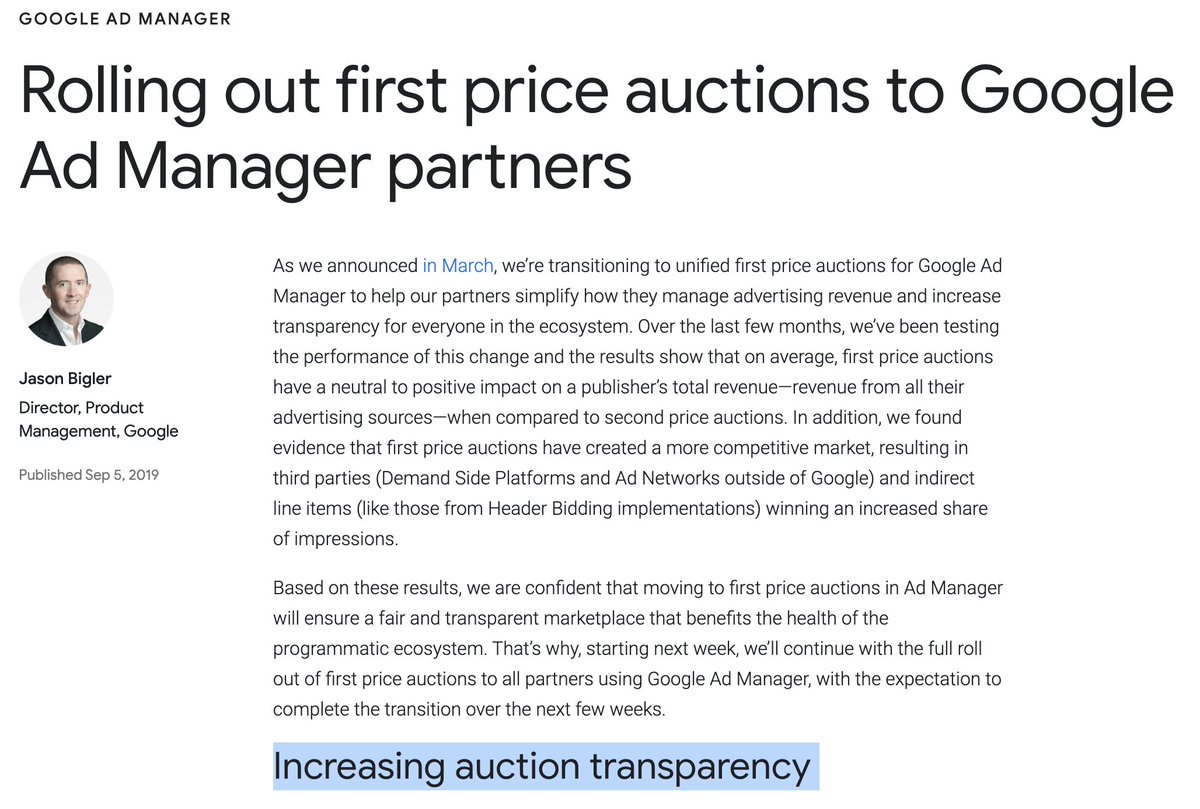Today is @ShengwuLi& #39;s birthday! An incredible coauthor! An excuse to write about our ECTA paper on "credible mechanisms."
There, we made a theoretical prediction that in the online world, real 2nd-price auctions can& #39;t survive! Google made the prediction official soon after: 1/N
There, we made a theoretical prediction that in the online world, real 2nd-price auctions can& #39;t survive! Google made the prediction official soon after: 1/N
Key question: Who "guards the guardian?"
We typically think of the planner of economic systems as someone who will follow the rules precisely, even after observing the actions of players. But, what if those who "guard" the mechanism have their own motives & can cheat? 2/N
We typically think of the planner of economic systems as someone who will follow the rules precisely, even after observing the actions of players. But, what if those who "guard" the mechanism have their own motives & can cheat? 2/N
Here& #39;s an example for the key idea. Auctioneer (thanks to @rbmyerson!) can lie to Shengwu that the 2nd highest bid was 95. Shengwu can& #39;t detect the lie, unless he observes *my* bid. If I have privacy concerns or if I& #39;m anonymous to Shengwu, he can& #39;t detect such deviation. 3/N
Can the auctioneer do the same in a 1st price auction? Well, he can come back to @ShengwuLi & say "I know your value is higher than your bid in a 1st price auction, so pay a bit more." But this deviation is *observable* to Shengwu with his own information. 4/N
Is this intellectual fantasy of some theorists and our institutions won& #39;t let it happen? Well, one hopes, but the sad news is that it& #39;s a fairly common practice. Here& #39;s one example, of many, of cheating in 2nd price auctions: ( https://bit.ly/3rfcxAR )">https://bit.ly/3rfcxAR&q... 5/N
Issue of "can I trust the mediator?" goes beyond online auctions. In many mechanisms players can& #39;t share their data & verify things. Think of lotteries: How can you ensure that lottery was uniformly at random? Even art auctions, that majority of winners aren& #39;t in the room. 6/N
We imagine a new world, a world in which communication has a "star-like" structure: you communicate with the auctioneer, but not with other players. This is a how advertising, NRMP, lottery systems, & to a large extend spectrum & art auctions work. 7/N
In our world, the mediator can lie to me about other players& #39; actions, so long as there& #39;s a story that justifies what happens with positive probability (an "innocent explanation"). Like in our original example, an innocent explanation is "2nd highest value was truly 95." 8/N
So our mediator can "safely" deviate, so long as she has an innocent explanation, and she may do so given her utility function. We then call a mechanism *credible* if it is incentive-compatible for the mediator not to deviate. 9/N
Now consider selling a single-item in a Myersonian world! Recall the classic result: 2nd price auction is the *unique* static (sealed-bid) strategy-proof (truthful) auction--it& #39;s awesome, isn& #39;t it?!
What, then, explains the widespread use of 1st price & ascending auctions? 9/N
What, then, explains the widespread use of 1st price & ascending auctions? 9/N
One answer, we believe, is credibility! In fact, credibility turns out to be a desiderata that helps characterize 1st price & ascending auctions! Here& #39;s the first main theorem:
-- The 1st price auction is the *unique* static, credible auction. (10/N)
-- The 1st price auction is the *unique* static, credible auction. (10/N)
Our second theorem, the proof of which consumed a full week of Broadsheet Coffee & we& #39;re still surprised it actually is true, is this:
-- The ascending auction is the *unique* credible, strategy-proof auction (in the class of all dynamic mechanisms you can design!). 11/N
-- The ascending auction is the *unique* credible, strategy-proof auction (in the class of all dynamic mechanisms you can design!). 11/N
These results imply an auction trilemma: Static, strategy-proof, or credible: An optimal auction can have any 2 of these, but not all 3 at once. Moreover, picking 2 out of 3 characterizes each of the standard auction formats (1st price, 2nd price, and ascending). 12/N
With Google switching to 1st price auction, the lovely 2nd price auction is once again lonely. And, well, our paper claims deservedly so!
Let me close by our last paragraph of introduction.
Link: http://web.stanford.edu/~mohamwad/Credible.pdf
And,">https://web.stanford.edu/~mohamwad... happy birthday to the one & only @ShengwuLi! N/N
Let me close by our last paragraph of introduction.
Link: http://web.stanford.edu/~mohamwad/Credible.pdf
And,">https://web.stanford.edu/~mohamwad... happy birthday to the one & only @ShengwuLi! N/N

 Read on Twitter
Read on Twitter








